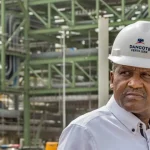A fresh wave of competition has hit Nigeria’s petroleum sector as fuel importers slash petrol prices below those offered by the Dangote Petroleum Refinery. The development comes amid calls by the Dangote Group President for a ban on fuel importation to protect local refining.
Recent findings reveal that some filling stations in Lagos and Ogun States are now selling petrol for less than N860 per litre. This is cheaper than the prices at outlets supplied by the Dangote refinery, such as MRS and Heyden, which are selling between N865 and N875. In Ogun State, a station named SGR has reduced its pump price to N847 per litre.
Industry sources confirm that many importers have cut their ex-depot prices below Dangote’s N820 per litre. Some major depots, including Aiteo and Menj, were selling at N815 per litre as of Tuesday, according to data from Petroleumprice.ng.
This pricing strategy is seen as a survival move by importers who have previously struggled to stay afloat following Dangote’s market entry and subsequent price reductions.
The National Publicity Secretary of the Independent Petroleum Marketers Association of Nigeria (IPMAN), Chinedu Ukadike, confirmed the trend, stating that while Dangote sells at N820 and NNPC at N825, several importers are offering between N815 and N817.
Ukadike praised the ongoing price competition as a direct benefit of market liberalisation, warning against any attempt to restrict importation. “Nobody should be stopped from bringing in petroleum products,” he said. “The market must remain open to encourage fairness and price regulation through local production.”
While marketers welcome the competition, Dangote argues it is unsustainable and damaging to local industry. He insists that the influx of imported fuel is undermining domestic refining efforts and discouraging investment.
Calling on the government to implement a “Nigeria First” policy in the petroleum sector, Dangote urged restrictions on fuel imports. He claimed that importers are flooding the market with substandard and toxic fuel blends that would not be accepted in Europe or North America.
He also accused some players of dumping discounted products, particularly from Russia, which further distorts local market prices. “These products are sold at prices lower than our production cost, creating an uneven playing field,” he said.
Dangote argued that local producers face increasing difficulty competing with heavily subsidised and low-grade imports, some of which allegedly exploit global price caps and loopholes in regulation.
Citing examples from the United States, Canada, and the European Union, Dangote called for policy action to protect African refiners from “unfair competition.”
However, marketers and downstream players continue to resist the call for import bans. They argue that open competition is essential for stabilising prices and ensuring consumer access, especially while Nigeria’s refining capacity continues to ramp up.
For now, Nigerians are benefitting from the price drops at the pump. But as the tug-of-war between local refiners and fuel importers intensifies, the battle over Nigeria’s fuel supply future is far from settled.










